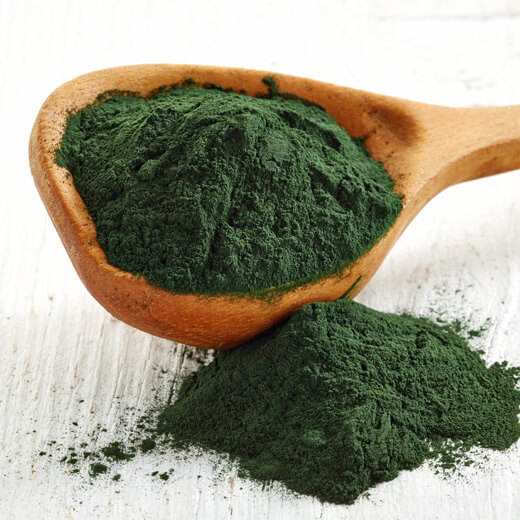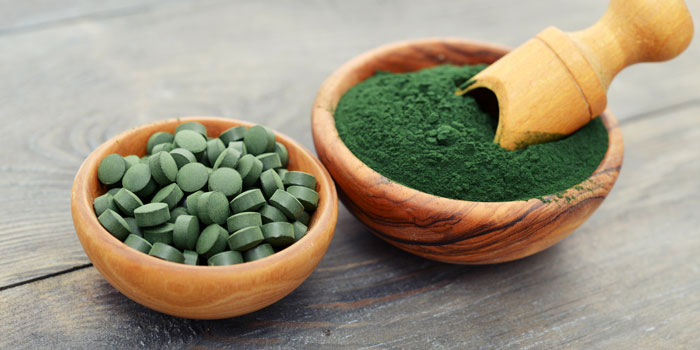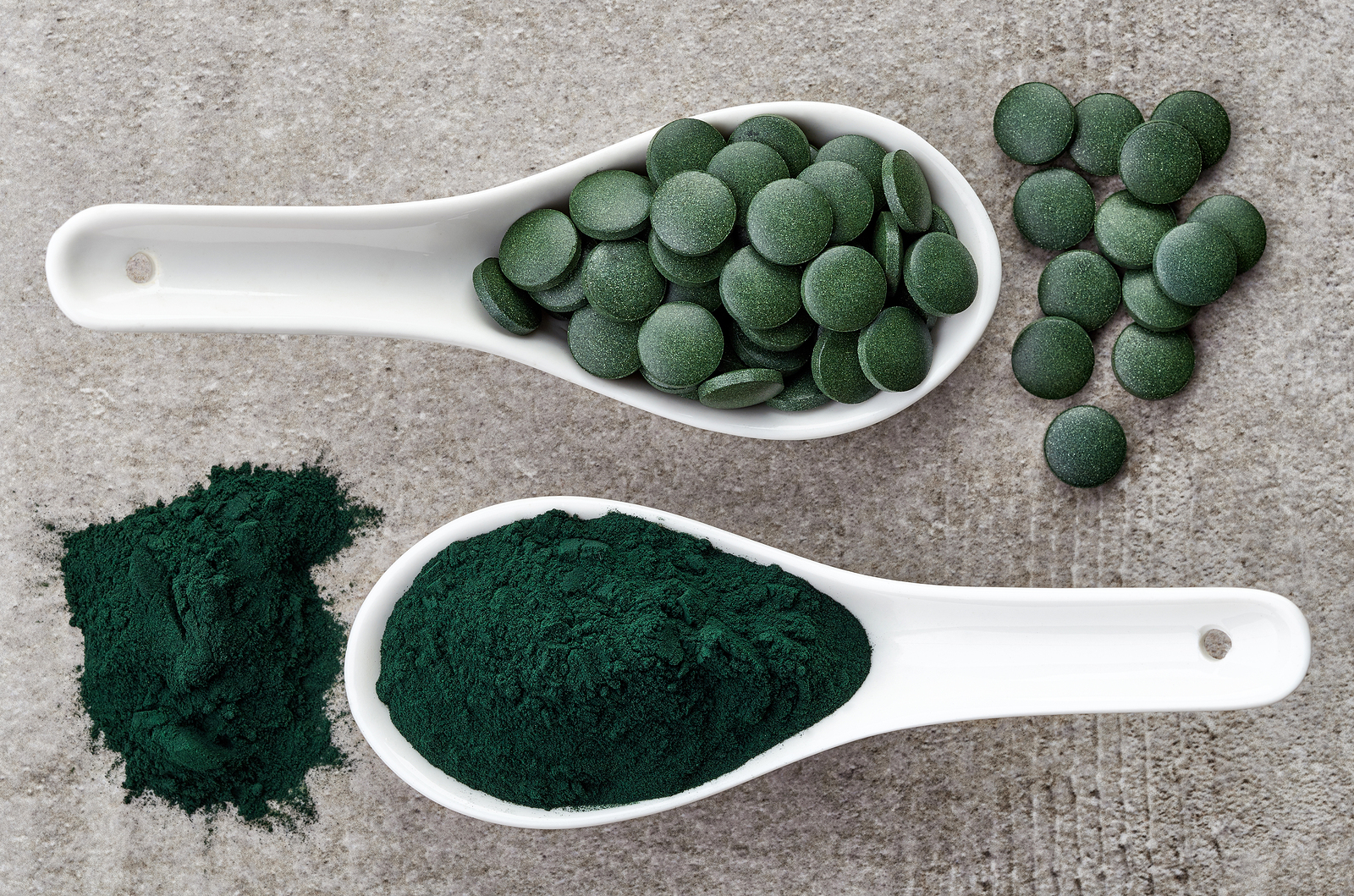Spirulina is an organism that grows in both fresh and salt water. It’s a spiral-shaped, multi-celled plant with no true nucleus. It’s a natural “algae” (cyanbacteria), which is a family of single-celled microbes that are often referred to as blue-green algae.

Spirulina grows best in low-alkaline conditions — particularly, fresh water lakes, ponds and rivers. It is rich in Chlorophyll, and like plants, gets its energy from the sun.
Believed to have been a staple for the Aztecs, recorded history dating to the Conquistadors confirms that spirulina cakes were regularly sold as far back as the 16th century. Spirulina was a primary source of protein for the Aztecs for several hundred years and Lake Texcoco remains an abundant fountainhead of this superfood still today.
Grown around the world from Mexico to Africa to even Hawaii, spirulina is renowned for its intense flavour and even more powerful nutrition profile. It is dried and made into cakes for use in a number of recipes. It is incredibly high in protein and a good source of antioxidants, B-vitamins and other nutrients, and is typically recommended to vegetarians due to its high natural iron content. The high concentration of protein and iron also makes it ideal after surgery, or anytime the immune system needs a boost.
Spirulina benefits are so profound that taken on a daily basis they could help restore and revitalise your health! To date, there are nearly 1,700 peer-reviewed scientific articles evaluating its health benefits. When harvested correctly from non-contaminated ponds and bodies of water, it is one of the most potent nutrient sources available.
Spirulina Benefits
Very Nutritious
This tiny alga is packed with nutrients. A single tablespoon (7 grams) of dried spirulina powder contains:
|
· Calories: 20 kcal
· Protein: 4.02 g
· Carbohydrate: 1.67 g
· Fat: 0.54 g
· Calcium: 8 milligrams (mg)
· Magnesium: 14 mg
· Phosphorus: 8 mg
· Potassium: 95 mg
|
· Sodium: 73 mg
· Iron: 2 mg (11% of the RDA)
· Copper: 21% of the RDA
· Vitamin C: 0.7 mg
· Vitamin B1 (thiamine): 11% of the RDA
· Vitamin B2 (riboflavin): 15% of the RDA
· Vitamin B3 (niacin): 4% of the RDA
· Also contains folate, and vitamins B-6, A, and K.
|
Gram for gram, spirulina may be the single most nutritious food on the planet.
A tablespoon of spirulina also provides both omega-6 and omega-3 fatty acids in an approximately 1.5–1.0 ratio.
The quality of the protein in spirulina is considered excellent — comparable to eggs. It gives all the essential amino acids that you need.
It is often claimed that spirulina contains vitamin B12, but this is false. It has pseudovitamin B12, which has not been shown to be effective in humans.
Anti Inflammatory & Antioxidant Properties
Spirulina is a fantastic source of antioxidants, which can protect against oxidative damage. Its main active component is called phycocyanin. This antioxidant substance also gives spirulina its unique blue-green colour. Phycocyanin can fight free radicals and inhibit production of inflammatory signaling molecules, providing impressive antioxidant and anti-inflammatory effects.
Fatty structures in your body are susceptible to oxidative damage. This is known as lipid peroxidation, a key driver of many serious diseases. For example, one of the key steps in the development of heart disease is the oxidation of “bad” LDL cholesterol. Interestingly, the antioxidants in spirulina appear to be particularly effective at reducing lipid peroxidation in both humans and animals.
In a study in 37 people with type 2 diabetes, 8 grams of spirulina per day significantly reduced markers of oxidative damage. It also increased levels of antioxidant enzymes in the blood.
May Control Diabetes
A 2018 review study found that spirulina supplementation significantly lowered people's fasting blood glucose levels. High fasting blood sugar is a common problem in people with diabetes type 1 and 2. This suggests that spirulina supplements may help people control diabetes.
In a two-month study in 2001, 2 grams of spirulina per day led to an impressive reduction in blood sugar levels in 25 people with type 2 diabetes. However, more studies are necessary.
May Lower Cholesterol

A 2016 systematic review and meta-analysis suggests that taking spirulina supplements may have a positive impact on blood lipids, which are fats in the blood. In the study, spirulina was found to significantly reduce total cholesterol and lower LDL — "bad" — cholesterol while increasing HDL — "good" — cholesterol.
A 2013 study also supports this health claim. Researchers found that taking 1 g of spirulina every day reduced participant's total cholesterol after 3 months. Another study in 2014 people with high cholesterol determined that 1 gram of spirulina per day lowered triglycerides by 16.3% and “bad” LDL by 10.1%.
In a study in 2001, 25 people with type 2 diabetes, 2 grams of spirulina per day significantly improved these markers.
Several other studies have found favourable effects — though with higher doses of 4.5–8 grams per day.
May Lower Blood Pressure
Phycocyanin is a pigment found in the spirulina that scientists have discovered possesses antihypertensive effects (it lowers blood pressure). Japanese researchers claim that this is because consuming the blue-green algae reverses endothelial dysfunction in metabolic syndrome.
A small-scale 2016 study found that eating spirulina regularly for 3 months reduced people's blood pressure when they were overweight and had hypertension.
While 1 gram of spirulina is ineffective, a dose of 4.5 grams per day has been shown to reduce blood pressure in individuals with normal levels. This reduction is thought to be driven by an increased production of nitric oxide, a signaling molecule that helps your blood vessels relax and dilate.
May Reduce Allergic Symptoms
A 2013 study states that spirulina can relieve nasal inflammation and reduce histamine in the body. Compared to a placebo, 2 grams per day dramatically reduced symptoms like nasal discharge, sneezing, nasal congestion and itching in 127 people with allergic rhinitis.
May Detox Your Body from Heavy Metals
After giving 24 patients affected by chronic arsenic poisoning spirulina extract (250 milligrams) plus zinc (2 milligrams) twice daily, they compared the results with 17 patients who took a placebo and found that the spirulina-zinc combination helped in clearing the arsenic. Ultimately, the participants experienced a 47 percent decrease of arsenic in their body.
Apart from arsenic, a 2016 review found that spirulina had antitoxic properties that could counteract other pollutants in the body, such as: fluoride, iron, lead and mercury.
May Eliminate Candida
Spirulina appears to help with yeast infections. Several animal studies have shown that it’s an effective antimicrobial agent, particularly for candida.
Spirulina benefits have been shown to promote the growth of healthy bacterial flora in the intestines, which in turn inhibits candida from thriving. Additionally, the immune-strengthening properties of spirulina will help the body eliminate candida cells.
May Aid Mental Health
A 2018 paper highlights the potential role that spirulina could play in treating mood disorders. The theory is that spirulina is a source of tryptophan. Tryptophan is an amino acid that supports serotonin production. Serotonin plays an important role in mental health.
People with certain mental health conditions, such as depression and anxiety, may have reduced levels of serotonin. Taking tryptophan supplements to maintain healthful serotonin levels may play a role in supporting mental wellbeing. Researchers need to conduct more clinical trials before they know the true role of spirulina in supporting mental health.
Anti Cancer Properties
According to the University of Maryland Medical Center, “A number of animal and test tube studies suggest that spirulina increases production of antibodies, infection-fighting proteins, and other cells that improve immunity and help ward off infection and chronic illnesses such as cancer.”
Spirulina’s effects on oral cancer — or cancer of the mouth — have been particularly well studied. One study examined 87 people from India with precancerous lesions — called oral submucous fibrosis (OSMF) — in the mouth. Among those who took 1 gram of spirulina per day for one year, 45% saw their lesions disappear — compared to only 7% in the control group. When these people stopped taking spirulina, almost half of them redeveloped lesions in the following year.
In another study of 40 individuals with OSMF lesions, 1 gram of spirulina per day led to greater improvement in OSMF symptoms than the drug Pentoxyfilline.
Recipes for Health
Spirulina is available in powder or tablet form. A standard daily dose of spirulina is 1–3 grams, but doses of up to 10 grams per day have been used effectively. As a powder, people can:
· add it to smoothies, which gives the drink a green colour
· sprinkle spirulina powder on salads or in soups
· mix it into energy balls, along with other healthful ingredients
· stir a tablespoon into fruit or vegetable juices
Date and Spirulina Energy Balls
Ingredients:
- 20 medjool dates, pitted
- 2 cups walnut pieces
- 1 teaspoon Spirulina Powder
- 1/2 cup hemp seeds
- 1/4 cup unsweetened coconut flakes, plus 1/4 cup for coating
Directions:
1. Place walnuts, dates, hemp seeds, spirulina, and 1/4 cup of coconut into food processor and mix until it becomes sticky and starts to form a ball (around 2 minutes).
2. Take dough from food processor and form 1 inch balls.
3. Roll the balls into the remaining coconut to coat them.
4. Serve immediately or refrigerate in an airtight container for up to 5 days.
Spirulina ice cream
Ingredients:
- 2 frozen peeled bananas
- 1 tsp spirulina powder
Directions:
1. Place frozen bananas in blender, food processor or smoothie machine.
2. Mix in spirulina, stir and serve.
Precautions
If you have an autoimmune condition, it’s a good idea to take this supplement under the supervision of your healthcare provider as there have been some cases of autoimmune reactions.
It’s absolutely critical to make sure that the quality and purity of the spirulina that you consume is of the highest standards. Particularly, like anything that comes from the sea, be certain to only purchase blue-green algae that is free from contamination.
Spirulina could contain the amino acid phenylalanine and thus should be avoided by people who have phenylketonuria (PKU) — a metabolic disorder in which the body can't metabolise phenylalanine.
Always consult a health profession before taking spirulina for any reactions including any drug interactions.
Also, some sources suggest that pregnant women and children should not consume algae. Contact your natural health care provider to confirm whether or not you should be using spirulina supplements.

To Sum Up…
Spirulina is a type of cyanobacteria — often referred to as blue-green algae — that is incredibly healthy.
It has been well-researched for its many potential benefits. Some of the most significant of them include detoxing heavy metals, eliminating candida, fighting cancer and lowering cholesterol and blood pressure.
Spirulina may cause autoimmune reactions in some who are susceptible to autoimmunity. It’s also not recommended for pregnant women or children. Be cautious where you purchase spirulina, as it may be contaminated if not bought from a high-quality source, leading to additional spirulina side effects.
While more research is needed before any strong claims can be made, spirulina may be one of the few superfoods worthy of the title.
Sources
https://www.medicalnewstoday.com/articles/324027.php
https://www.healthline.com/nutrition/10-proven-benefits-of-spirulina#section2
https://draxe.com/spirulina-benefits/
https://wellnessmama.com/4738/spirulina-benefits/
https://www.nutrex-hawaii.com/blogs/recipes
